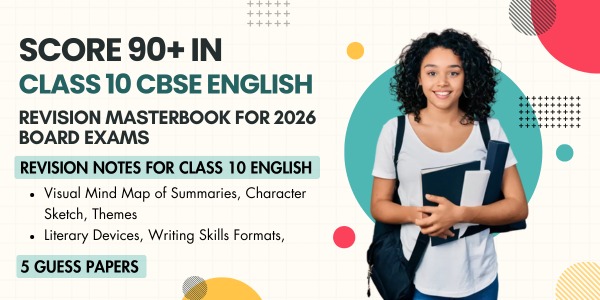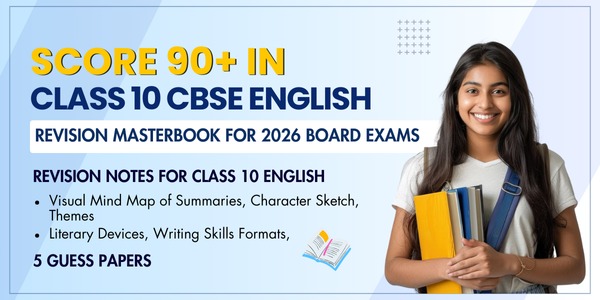
CBSE Class 10 English Chapter 5 Glimpses of India Part 3 Tea From Assam Question Answers (Important) from First Flight Book
Tea from Assam Question Answers – Looking for Glimpses of India (Part 3) Tea from Assam questions and answers (NCERT solutions) for CBSE Class 10 English First Flight Book Chapter 5? Look no further! Our comprehensive compilation of important questions will help you brush up on your subject knowledge. Practising Class 10 English question answers can significantly improve your performance in the board exam. Our solutions provide a clear idea of how to write the answers effectively. Improve your chances of scoring high marks by exploring Chapter 5: Glimpses of India (Part 3) Tea from Assam question answers now. The questions listed below are based on the latest CBSE exam pattern, wherein we have given NCERT solutions to the chapter’s extract based questions, multiple choice questions, short answer questions, and long answer questions.
Also, practising with different kinds of questions can help students learn new ways to solve problems that they may not have seen before. This can ultimately lead to a deeper understanding of the subject matter and better performance on exams.
- Glimpses of India – Tea from Assam Part 3 NCERT Solutions
- Glimpses of India – Tea from Assam Part 3 Chapter 5 Extract Based Questions
- Glimpses of India – Tea from Assam Part 3 Short Answer Questions
- Class 10 Chapter 5 Glimpses of India – Tea from Assam Part 3 Long Answer Questions
Related:
- Glimpses Of India Part 3 Tea from Assam – Summary, Explanation
- Glimpses of India Character Sketch
- Glimpses of India MCQs
- Glimpses of India Previous Years Question with Answers
Tea from Assam NCERT Solutions
1. Look at these words: upkeep, downpour, undergo, dropout, walk-in. They are built up from a verb (keep, pour, go, drop, walk) and an adverb or a particle (up, down, under, out, in). Use these words appropriately in the sentences below. You may consult a dictionary.
- A heavy __________ has been forecast due to low pressure in the Bay of Bengal.
- Rakesh will __________ major surgery tomorrow morning.
- My brother is responsible for the __________ of our family property.
- The __________ rate for this accountancy course is very high.
- She went to the Enterprise Company to attend a __________ interview.
Answers-
- A heavy downpour has been forecast due to low pressure in the Bay of Bengal.
- Rakesh will undergo major surgery tomorrow morning.
- My brother is responsible for the upkeep of our family property.
- The dropout rate for this accountancy course is very high.
- She went to the Enterprise Company to attend a walk-in interview.
2. Now fill in the blanks in the sentences given below by combining the verb given in brackets with one of the words from the box as appropriate.
Over, by, through, out, up, down
- The Army attempted unsuccessfully to __________ the Government. (throw)
- Scientists are on the brink of a major __________ in cancer research. (break)
- The State Government plans to build a __________ for Bhubaneswar to speed up traffic on the main highway. (pass)
- Gautama’s__________ on life changed when he realised that the world is full of sorrow. (look)
- Rakesh seemed unusually__________ after the game. (cast)
Answers-
- The Army attempted unsuccessfully to overthrow the Government. (throw)
- Scientists are on the brink of a major breakthrough in cancer research. (break)
- The State Government plans to build a by-pass for Bhubaneswar to speed up traffic on the main highway. (pass)
- Gautama’s outlook on life changed when he realised that the world is full of sorrow. (look)
- Rakesh seemed unusually downcast after the game. (cast)
3. Think of suitable -ing or -ed adjectives to answer the following questions. You may also use words from those given above. How would you describe
- a good detective serial on television?
- a debate on your favourite topic ‘Homework Should Be Banned’?
- how you feel when you stay indoors due to incessant rain?
- how you feel when you open a present?
- how you feel when you watch your favourite programme on television?
- the look on your mother’s face as you waited in a queue?
- how you feel when tracking a tiger in a tiger reserve forest?
- the story you have recently read, or a film you have seen?
Answers-
- a good detective serial on television? Interesting
- a debate on your favourite topic ‘Homework Should Be Banned’? Exciting
- how you feel when you stay indoors due to incessant rain? Bored
- how you feel when you open a present? Excited
- how you feel when you watch your favourite programme on television? Interested
- the look on your mother’s face as you waited in a queue? Tired
- how you feel when tracking a tiger in a tiger reserve forest? Thrilled
- the story you have recently read, or a film you have seen? Boring
Tea from Assam Extract-based questions
Extract-based questions are of the multiple-choice variety, and students must select the correct option for each question by carefully reading the passage.
A. It was a magnificent view. Against the backdrop of densely wooded hills a sea of tea bushes stretched as far as the eye could see. Dwarfing the tiny tea plants were tall sturdy shade-trees and amidst the orderly rows of bushes busily moved doll-like figures. In the distance was an ugly building with smoke billowing out of tall chimneys.
“Hey, a tea garden!” Rajvir cried excitedly.
Pranjol, who had been born and brought up on a plantation, didn’t share Rajvir’s excitement.
1. Dwarfing the tiny tea plants were tall sturdy shade-trees, means –
a. The tea plants were not growing well
b. The shade trees were dwarfs
c. The tea plants looked small in comparison to the shade trees
d. The tea plants were tall like the shade trees
A. c
2. ‘Doll-like figures’ refers to-
a. Scarecrow
b. Tea plucker
c. children playing
d. All of these
A. b
3. Why were these doll-like figures moving?
A. They were busy plucking the tea leaves
4. Find a synonym of ‘moving’.
A. Billowing
5. Why did Pranjol not share Rajvir’s excitement?
A. As he had been born and brought up on a plantation, he was not excited to see one.
B. “Tell me another!” scoffed Pranjol.
“We have an Indian legend too. Bodhidharma, an ancient Buddhist ascetic, cut off his eyelids because he felt sleepy during meditations. Ten tea plants grew out of the eyelids. The leaves of these plants when put in hot water and drunk banished sleep.
“Tea was first drunk in China,” Rajvir added, “as far back as 2700 B.C.! In fact words such as tea, ‘chai’ and ‘chini’ are from Chinese. Tea came to Europe only in the sixteenth century and was drunk more as medicine than as beverage.”
1. What does ‘scoffed’ mean?
a. He was angry
b. He was upset
c. He found it silly
d. He was tired
A. c
2. Find a synonym of ‘story’
A. Legend
3. Find a synonym of austere
A. Ascetic
4. ‘Banished’ means-
a. To support
b. To put away
c. to grow
d. None of these
A. b
5. What does he mean by saying that tea was drunk more as medicine than as beverage?
A. It means that tea was consumed for its medicinal properties and not merely as a hot drink
C. Read the given extract and answer the questions that follow:
CHAI GARAM garam chai a vendor called out in a high pitched voice,
He came up to their window and asked, “Cha, saab?”
“Give us two cups,” Pranjol said. They sipped the steaming hot liquid. Almost everyone in their compartment was drinking tea too. “Do you know that over eighty crore cups of tea are drunk every day throughout the world?” Rajvir said.
1. Who was speaking in a high pitched voice and what?
A. A vendor was speaking in a high pitched voice for Chai-garam
2. What did Pranjol ask the tea vendor?
A. Pranjol asked the tea-vendor to give two cups of tea.
3. What did Rajvir tell Pranjol?
A. Rajvir told Pranjol that over eighty crore cups of tea are drunk every day throughout the world.
4. Pick out the word from the passage that means the same as- drank.
A. “sipped”
D. Read the given extract and answer the questions that follow:
“Whew!” exclaimed Pranjol. “Tea really is very popular. The train pulled out of the station. Pranjol buried his nose in his detective book again Rajvir too was an ardent fan of detective stories, but at the moment he was keener on looking at the beautiful scenery. It was green, green everywhere Rajvir had never seen so much greenery before. Then the soft green paddy fields gave way to tea bushes.
1. What was exclaimed by Pranjol?
A. Pranjol exclaimed “Tea is really very popular”.
2. What was Pranjol doing on the train?
A. Pranjol was reading detective stories from a novel.
3. What was surprising for Rajvir?
A. Rajvir was surprised to see the beautiful scenery.
4. Pick out a word from the passage that means the same as- firm.
A. ardent
E Read the given extract and answer the questions that follow:
It was a magnificent view Against the backdrop of densely wooded hills a sea of tea bushes stretched as far as the eye could see. Dwarfing the tiny tea plants were tall sturdy shade-trees and amidst the orderly rows of bushes busily moved doll-like figures, in the distance was an ugly building with smoke billowing out of tall chimneys. “Hey, a tea garden!” Rajvir cried excitedly. Pranjol, who had been born and brought up on a plantation, didn’t share Rajvir’s excitement.
1. Which view had been referred to above?
A. The view of the tea plantation was magnificent.
2. What has been compared with the tea plantation?
A. The tea garden had been compared with a vast sea.
3. Why was Rajvir excited?
A. Rajvir was excited after seeing the tea garden.
4. Pick out a word from the passage that means the same as- “beautiful”.
A. magnificent
F. Read the given extract and answer the questions that follow:
“Oh, this is tea country now, he said, “Assam has the largest concentration of plantations in the world. You will see enough gardens to last you a lifetime “Thave been reading as much as could about tea” Rajvir said. “No one really knows who discovered tea but there are many legends” What legends?
“Well, there’s the one about the Chinese emperor who always boiled water before drinking it. One day a few leaves of the twigs burning under the pot fell into the water giving it a delicious flavour. It is said they were tea leaves. Tell me another scoffed Pranjol.
“We have an Indian legend too. Bodhidharma, an ancient Buddhist ascetic, cut off his eyelids because he felt sleepy during meditations. Ten tea plants grew out of the eyelids. The leaves of these plants when put in hot water and drunk banished sleep.
1. What did Rajvir say?
A. Rajvir said that Assam had the largest concentration of plantations in the world.
2. What was he telling him?
A. He was telling him the legends about the origin of tea. There are many legends about the origin of tea.
3. What was done by the Buddhist ascetic?
A. The Buddhist monk cut off his eyelids and threw them away.
4. Pick out a word from the passage that means the same as-tasty.
A. delicious
G. Read the given extract and answer the questions that follow:
“Tea was first drunk in China,” Rajvir added, as far back as 2700 BC in fact words such as tea, cha? and chin? Chinese Tea came to Europe only in the sixteenth century and was drunk more as medicine than as beverage.
The train clattered into Manani junction. The boys collected their luggage and pushed their way to the crowded platform. Pranjol’s parents were waiting for them. Soon they were driving towards Dhekiabari, the tea garden managed by Pranjol’s father.
1. Where was tea first drunk?
A. Tea was first drunk in China.
2. Which words are from Chinese?
A. Cha and Chini words are from Chinese.
3. When did tea come to Europe?
A. In the Sixteenth century, tea came to Europe.
4. Pick out the word from the passage that means the same as- a period of a hundred years.
A. century
H. Read the given extract and answer the questions that follow:
An hour later the car veered sharply off the mail road. They crossed a cattle-bridge and entered Dhekiabari Tea Estate On both sides of the gravel road were acre upon acre of tea bushes, all neatly pruned to the same height. Groups of tea-pluckers, with bamboo baskets on their backs, wearing plastic aprons, were plucking the newly sprouted leaves Pranjol’s father slowed down to allow a tractor, pulling a trailer load of tea leaves, to pass “This is the second flush or sprouting period, isn’t it, Mr Barua Rajvir asked “It lasts from May to July and yields the best tea.
1. What was worn by the women?
A. The women wore plastic aprons.
2. What were they doing?
A. They were plucking the newly sprouted leaves.
3. When is the best yield for tea?
A. The best yield lasts from May to July.
4. Pick out the word from the passage that means the same as-‘clothes’.
A. aprons
Top
Class 10 English Glimpses of India (Part 3) Tea From Assam Short Question Answers (including questions from Previous Years Question Papers)
In this post we are also providing important short answer questions from the chapter Glimpses of India (Part 3) Tea from Assam for CBSE Class 10 Boards in the coming session. These questions have been taken from previous years class 10 Board exams and the year is mentioned in the bracket along with the question.
Q1. Which Chinese story did Rajvir tell about the discovery of tea?
OR
What is the Chinese legend regarding tea ? (CBSE 2012)
Ans. There was a Chinese story about tea. It was said that there was a Chinese emperor. He always drank boiled water. Once while boiling the water, some leaves of the burning twigs fell into the pot. The boiled water gave a delicious flavour. They were tea leaves.
Q2. Narrate the story of a Buddhists monk behind the discovery of tea?
Ans. There was a Buddhist monk story about tea. A Buddhist ascetic was busy in his meditation for God. By chance he fell asleep and his meditation broke. He did not like it. In a state of anger he cut his eyelids and threw them on the earth. Tea plants appeared out of these eyelids. Then these leaves were put in the hot water. When people drank the hot water, it banished their sleep. In the beginning it was drunk as a medicine rather than a beverage.
Q3. Where was Rajvir going? Why?
Ans. Rajvir was going to Pranjol’s house in Assam. Pranjol has invited him to spend the summer vacations with him at his house. Moreover Rajvir was interested to know about the tea gardens in Assam. So he was going to Assam.
Q4. What excited Rajvir? Why did Pranjol not share his excitement?
OR
Why was Rajvir excited to see the tea gardens? (CBSE 2014)
OR
What made Rajvir amazed in the way? (CBSE 2012)
Ans. Rajvir had never seen the tea garden before. So the sight of the tea garden excited him. But Pranjol has been born and brought up in the tea plantations. He had seen them many times. So he did not share Rajvir’s excitement.
Q5. What are the various legends regarding the origin of tea?
OR
What legends are associated with the origin of tea? (CBSE 2016)
Ans. There was a Chinese story about tea. It was said that there was a Chinese emperor. He always drank boiled water. Once while boiling the water, some leaves of the burning twigs fell into the pot. The boiled water gave a delicious flavour. They were tea leaves.
There was a Buddhist monk story about tea. A Buddhist ascetic was busy in his meditation for God by chance he fell asleep and his meditation broke. He did not like it. In a state of anger, he cut his eyelids and threw them on the earth. Tea plants appeared out of these eyelids. Then these leaves were put in the hot water. When people drank the hot water, it banished their sleep. In the beginning it was drunk as a medicine rather than a beverage.
Top
Class 10 Glimpses of India (Part 3) Tea From Assam Long Answer Questions Lesson 5
Question 1 What are the legends of the discovery of tea?
OR
What are the various legends regarding the origin of tea?
Answer. There are two legends about the discovery of tea. According to one story, it was the Chinese emperor who discovered it accidentally. He always boiled water before drinking it. One day a few leaves of plants fell into the boiling water which gave it a delicious taste. It is said that they were tea leaves. The emperor started their use in boiling water. Another Indian legend says that an ancient Buddhist ascetic cut off his eyelids because he felt sleepy during meditation. Ten tea plants grew out of the eyelids. The leaves of these plants when put in hot water and drunk banished sleep. Thus, tea came into existence.
Question 2. Based on your reading of the chapter “Tea From Assam”, write a paragraph on the topic- importance of Tea in India.
OR
You know that everybody drinks tea everyday in India. It banishes our sleep and makes us feel fresh. Describe the importance of tea in India.
Answer – Today all people drink tea every day in India. But the quantity of tea differs from person to person. Life in an Indian house starts with a refreshing cup of tea, India has now surpassed China in tea production. India is one of the largest tea producers in the world 70 per cent of its tea is consumed within India. Assam and Darjeeling produced world renowned tea. Tea became widely popular in India during the 1950s. Tea industry is the second largest employer in the country. It is grown in many states in India. Tea plants need shade to grow besides the humid climate. It is a labour oriented industry. Tea has a number of medical and therapeutic properties.
Question 3 – Pranjol and Rajvir discuss their next vacation destination. They shortlist Coorg and Goa. Rajvir is keen on Coorg and tries to convince Pranjol. Develop a conversation between the two, based on your understanding of Glimpses of India. (CBSE SQP 2020-21)
You may begin like this:
Pranjol: I gave you the opportunity to explore a tea plantation last year, in Assam; I want to…
Answer – Rajvir: Hi Pranjol. We ought to go to Coorg, in my opinion. The area has lovely coffee farms. The aroma is already in the air!
Pranjol: We went to a tea farm in Assam last year; this time, I want to do something different.
Rajvir: The destination is Coorg then! There is more to Coorg than just the aroma of coffee. Rainforests, plants, and fauna are abundant. It would be a sight to remember. It would be extremely wonderful to relax along Kaveri’s coast.
Pranjol: That certainly sounds intriguing.
Rajvir: Furthermore, I believe that everyone deserves some time away from the pandemic’s chaos. Adventure sports like mountain biking, rappelling, and river rafting sound like fun.
Pranjol: I enjoy some sports, but I was looking for a quiet and collected exercise.
Rajvir: A bell is ringing. Coorg is the solution once more! The Brahmagiri hills provide a panoramic view, and there are lovely natural walking trails there. According to what I’ve read, the area is home to the largest Tibetan colony, thus the atmosphere will be serene and spiritual. I’m certain.
Pranjol: Are you serious?
Rajvir: Coorg has a diverse culture, brave people, and excellent hospitality. Just a select few persons in Coorg are permitted to possess weapons without a permit. It will be exciting to meet such brave people.
Pranjol: I have to admit that you do make a strong argument for Coorg. Let’s arrange to depart on Wednesday.
Top
Also See:
Class 10 English Syllabus
Character Sketches of Class 10 English
CBSE Class 10 English Lesson Explanation, Summary
CBSE Class 10 English Question Answers (Important)
CBSE Class 10 English MCQs
Class 10 English Complete Study Guide
Class 10 English First Flight book Prose word meanings
Class 10 English First Flight Poems word meaning
Class 10 English Footprints without Feet word meanings
List of Poetic Devices in Class 10 Poems (Poem-wise)
10 Important Poetic Devices for Class 10



